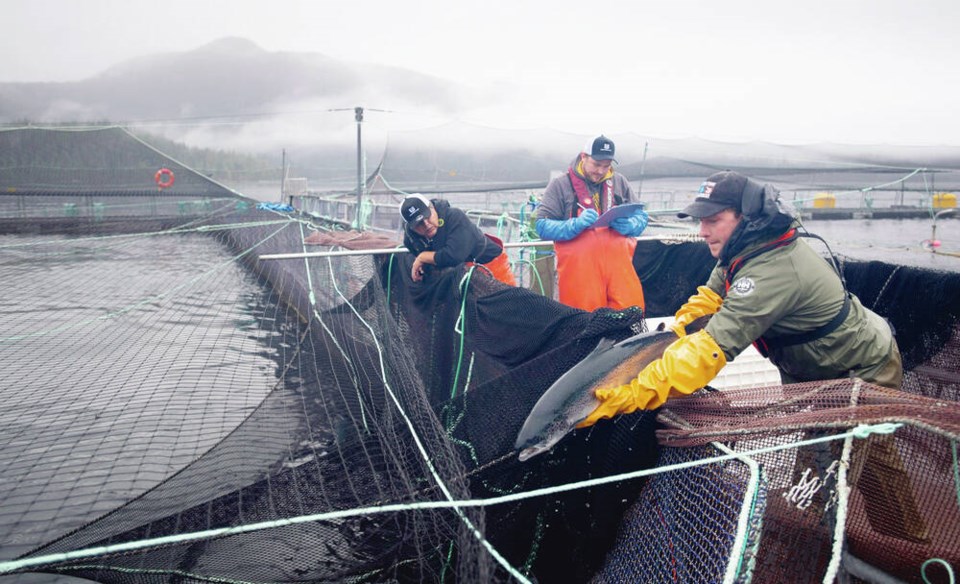The past two-plus years have been difficult times for Canadians. Many have been seriously ill, experienced the loss of a loved one and have faced economic hardship. We seen inflation hit highs not seen in decades, global supply chains stretched thin and increased tensions around the world.
For most, the worst appears to be over, but challenges persist. Environmental issues are not going away. Increasing demand for natural resources are spiking prices. Canadians remain concerned about jobs and the economy. And continuing shortages on our grocery shelves raise concerns over food security.
Thankfully, Canada is blessed with a geography that makes it ideal to supply markets here at home and around the world with a dependable supply of food. And this includes food grown on the land and in the water.
Aquaculture plays a vital role in providing both food and jobs to Canadians. The industry is worth $5.2 billion to the economy and employs more than 21,000 full-time workers, many of whom live in and work in remote coastal and First Nations communities. More than $1 billion worth of aquacultural products are exported annually.
You’ve also most likely eaten a product that is the result of aquaculture. Some 187,000 million tonnes of seafood are farmed annually, making up almost 20 per cent of all seafood sales in Canada. In B.C., the No. 1 food export is salmon, and most of this is responsibly produced farmed salmon.
It’s an important industry with a great potential for growth, but sustainable finish farming is under threat.
The federal government, despite objections from many B.C. First Nations and contrary to advice from its own scientists and marine biologists, has decided not to renew salmon farms licences in the Discovery Islands, off the coast of Vancouver Island.
These licenses are vital for jobs, the survival of many small- and medium-sized businesses, Vancouver Island First Nations and costal community prosperity, and to relieve the pressure on our wild salmon stocks. Without them, small businesses will close, people will lose their jobs and future investment could be threatened.
Not only that, fresh, farmed salmon helps Canada with its food security needs and reduces our carbon footprint by being able to buy local, instead of importing frozen salmon from elsewhere.
As British Columbians, we are deeply concerned over the decline our wild salmon stocks. Unfortunately, this is not a recent trend.
Wild salmon stocks have been on the decline since the 1950s due to overfishing, climate change and human encroachment into salmon habitat such as streams and spawning beds. We must reverse this harrowing trend, and responsible salmon farming can help achieve this. Supporting farmed salmon reduces pressure on wild salmon stocks.
In making its decision, the federal government did not properly consult with local First Nations, many of which have economic agreements in place with the salmon farmers. This regrettable decision flies in face of the government’s own commitment to reconciliation, consultation and the United Nations Declaration on the Rights of Indigenous Peoples Act.
Instead of recognizing that Indigenous peoples have the “right to self-determination, including the right to freely pursue their economic, political, social, and cultural development,” as stated in the principles respecting the Government of Canada’s relationship with Indigenous Peoples, the decision to pull the licences of the salmon farms, located in traditional territories, was done without full consent. Now many Indigenous workers face the prospect of unemployment.
This is not acceptable.
During the pandemic, governments asked Canadians to trust science. And the overwhelming majority of Canadians did just this. We followed social distancing guidelines, wore our masks, got vaccinated and made other sacrifices — at financial and at personal levels.
But now the federal government is choosing to ignore certain science. Not only that, the science it is choosing to ignore is its own. Marine biologists and scientists from the Department of Fisheries and Oceans report that the risk to wild salmon from aquaculture operations in the Discovery Islands is minimal.
Is it now acceptable to pick which science is to be trusted?
Prime Minister Justin Trudeau and Fisheries and Oceans Minister Joyce Murray need to trust their government’s own scientists and researchers, respect First Nations self-determination, and think about food security, jobs and economic development and renew the Discovery Islands salmon farm licences today. There’s too much at stake to say no.
Richard Harry is the executive director of the Aboriginal Aquaculture Association, a commercial fisherman and former chief of the Homalco First Nation; Ben James is the president of the Aquaculture Suppliers Association of Canada.



